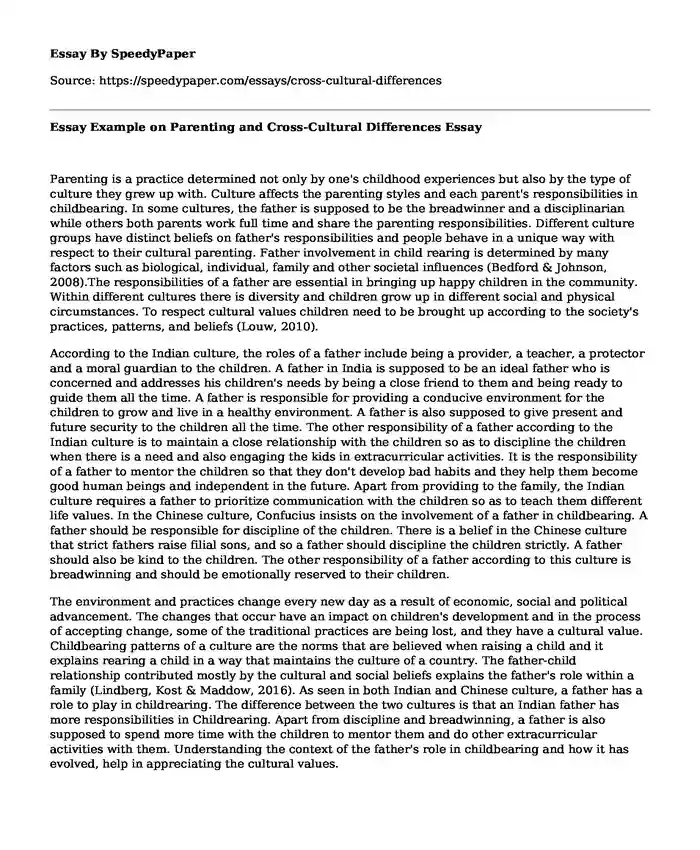Parenting is a practice determined not only by one's childhood experiences but also by the type of culture they grew up with. Culture affects the parenting styles and each parent's responsibilities in childbearing. In some cultures, the father is supposed to be the breadwinner and a disciplinarian while others both parents work full time and share the parenting responsibilities. Different culture groups have distinct beliefs on father's responsibilities and people behave in a unique way with respect to their cultural parenting. Father involvement in child rearing is determined by many factors such as biological, individual, family and other societal influences (Bedford & Johnson, 2008).The responsibilities of a father are essential in bringing up happy children in the community. Within different cultures there is diversity and children grow up in different social and physical circumstances. To respect cultural values children need to be brought up according to the society's practices, patterns, and beliefs (Louw, 2010).
According to the Indian culture, the roles of a father include being a provider, a teacher, a protector and a moral guardian to the children. A father in India is supposed to be an ideal father who is concerned and addresses his children's needs by being a close friend to them and being ready to guide them all the time. A father is responsible for providing a conducive environment for the children to grow and live in a healthy environment. A father is also supposed to give present and future security to the children all the time. The other responsibility of a father according to the Indian culture is to maintain a close relationship with the children so as to discipline the children when there is a need and also engaging the kids in extracurricular activities. It is the responsibility of a father to mentor the children so that they don't develop bad habits and they help them become good human beings and independent in the future. Apart from providing to the family, the Indian culture requires a father to prioritize communication with the children so as to teach them different life values. In the Chinese culture, Confucius insists on the involvement of a father in childbearing. A father should be responsible for discipline of the children. There is a belief in the Chinese culture that strict fathers raise filial sons, and so a father should discipline the children strictly. A father should also be kind to the children. The other responsibility of a father according to this culture is breadwinning and should be emotionally reserved to their children.
The environment and practices change every new day as a result of economic, social and political advancement. The changes that occur have an impact on children's development and in the process of accepting change, some of the traditional practices are being lost, and they have a cultural value. Childbearing patterns of a culture are the norms that are believed when raising a child and it explains rearing a child in a way that maintains the culture of a country. The father-child relationship contributed mostly by the cultural and social beliefs explains the father's role within a family (Lindberg, Kost & Maddow, 2016). As seen in both Indian and Chinese culture, a father has a role to play in childrearing. The difference between the two cultures is that an Indian father has more responsibilities in Childrearing. Apart from discipline and breadwinning, a father is also supposed to spend more time with the children to mentor them and do other extracurricular activities with them. Understanding the context of the father's role in childbearing and how it has evolved, help in appreciating the cultural values.
References
Bedford, V. A., & Johnson, N. (January 01, 2008). The role of the father. Midwifery, 4, 4, 190-195.
Lindberg, L. D., Kost, K., & Maddow-Zimet, I. (January 01, 2016). The Role of Men's Childbearing Intentions in Father Involvement. Journal of Marriage and Family.
Louw, A. (January 01, 2010). The constitutionality of a biological father's recognition as a parent. Potchefstroom Electronic Law Journal, 13, 3, 155-206.
Cite this page
Essay Example on Parenting and Cross-Cultural Differences. (2019, Dec 09). Retrieved from https://speedypaper.com/essays/cross-cultural-differences
Request Removal
If you are the original author of this essay and no longer wish to have it published on the SpeedyPaper website, please click below to request its removal:
- Law Essay Example. Statement a the Network Engineer of the Plaintiff.
- Free Essay on Research Question and Design
- Extraneous Variables in Nursing Research, Free Essay for Everyone
- Hostel Development, Essay Example for Everyone
- Podiatric Medicine Residency Application, Essay Sample
- Free Essay: Living Standards in an Economy
- Essay Sample on Sexual Harassment in Ford Motor Company
Popular categories





